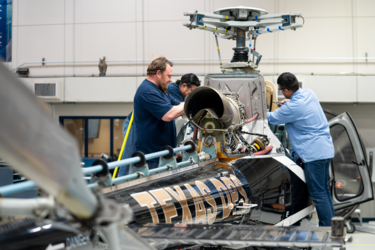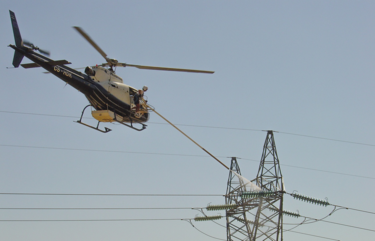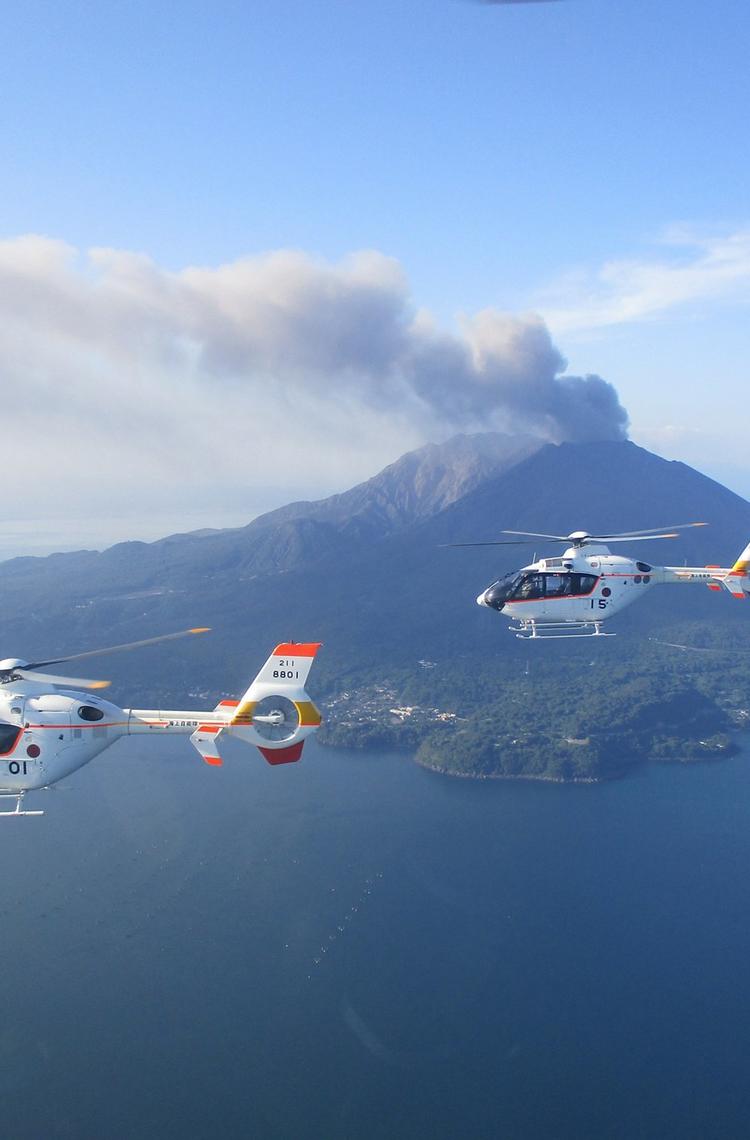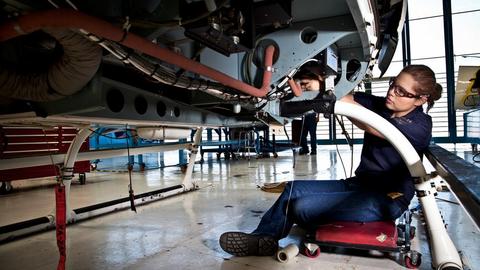Thirty-five years ago, helicopter operators transporting energy industry workers to offshore oil and gas rigs in the North Sea faced a dilemma: how to achieve the highest possible helicopter availability levels in a competitive industry booming with demand, while keeping costs under control.
One of the main players, Bristow Group found the answer for its fleet of Super Puma AS332 Mk1 helicopters: a relatively new approach to spare parts management called parts-by-the hour (PBH). In 1985, the operator signed up to become Aerospatiale’s (today Airbus Helicopters’) very first civil PBH customer.
Aerospatiale had first launched the concept with militaries such as the French Army. The company matured the idea and gained experience that would become transferable to the civil world. The premise of PBH was two-fold: ensure customers have access to needed parts as quickly as possible, thereby reducing aircraft downtime, in a budget-friendly manner.
To achieve these goals, Aerospatiale established on-site stocks at customer facilities and committed to replenishing these stocks with very short lead times. Customers enrolled in PBH would receive the needed part very quickly after an unscheduled need arose. And instead of having customers pay for parts on an ad-hoc basis, which would be unpredictable and costly, Aerospatiale asked customers to pay an agreed-upon rate per flight hour, thereby spreading the cost over the life of the contract.
The evolution towards HCare
Over the years, this early solution for guaranteeing parts availability has evolved into today’s various HCare global support contracts, which cover not only supply, but also the exchange, repair, and overhaul of helicopter parts and components (HCare Smart), as well as technical support and maintenance for customers looking for a guaranteed level of fleet availability (HCare Infinite).
These contracts have been growing in popularity in recent years. As of January 2020, more than 2,250 helicopters, or around 20% of Airbus’ worldwide helicopter fleet, was covered by an HCare Smart or Infinite contract.
How today’s HCare global support contracts work
“The main objective of today’s HCare offer is to propose flexible solutions that improve helicopter availability and safety, and help ease an operator’s budget planning,” said Christoph Zammert, Executive Vice President of Support & Services at Airbus Helicopters.
The payment plan of a fixed rate per flight hour still exists today. This arrangement allows operators to closely control maintenance budgets, protect cash flow, and lower the administrative burden through the management of one single contract.
Today, operators can choose from a menu of “by-the-hour” options (HCare Smart) focused on either the repair, exchange, or supply of parts. One step further is the comprehensive HCare Infinite contract, whereby Airbus makes full availability commitments, therefore guaranteeing aircraft availability.
An expansive global network
“Thanks to HCare, we gain a thorough understanding of a customer’s unique needs, which allows us to drastically improve our forecasts for them and organize our stocks accordingly so that the right part is always available,” said Zammert. “At the same time, delivery times are reduced and secured, and backed by penalties.”
Airbus Helicopters’ global network is well-equipped to support these goals, with four logistics centres and six local inventories worldwide. “We’re able to ensure parts availability for our HCare customers thanks to this global network and inventory, which we increased in 2020 – partially in response to COVID-19 – by adding 30,000 new part numbers,” says Zammert.

A solution for every operator
HCare global contracts can be tailored for all operator types, from low-frequency fliers, such as VIPS, to high-frequency fliers performing passenger transport. The contracts remains an important enabler for military and parapublic operators, who need to anticipate expenses and budgets for the coming fiscal year.
For civil operators whose core activity is business aviation, passenger transport or tourism, “this setup is beneficial because their revenues are generated by invoicing flight hours. So paying for support based on hours flown enables them to maintain a positive cash flow,” says Gaudry.
For police and air medical operators, having stable costs helps ease the internal budget validation process.
In celebration of 35 years, here’s a look at why three very different operators have chosen HCare global contracts:
The Japan Maritime Self Defence Force (JMSDF): 15 H135s enrolled with HCare Infinite
The JMSDF based in Kanoya-city, Kagoshima prefecture has been operating 15 H135 helicopters for ab-initio training since 2010 – a rigorous mission that depends on very high availability.
“Pilot training at JMSDF follows a pre-defined, fixed timeline. Completing the trainings on schedule requires having aircraft with very high availability,” says Captain Goto of JMSDF.
But managing the balance between supply and demand for parts is a time-consuming and costly effort, according to Goto. He says that before HCare Smart parts-by-the-hour was introduced, it took a long time for JMSDF to obtain spares, which resulted in low aircraft availability over long periods and disrupted JMSDF’s training targets.
This prompted the Ministry of Defense to introduce Performance-based Logistics (PBL) for parts supply and repair for the entire fleet of H135 training helicopters. The fleet has been enrolled in HCare Smart since October 2016.
“We did this to shorten the lead time and to reduce operational costs by easing parts stock management,” says Goto. “Thanks to our HCare Smart contract for parts supply and maintenance, JMSDF has been able to reduce costs and simplify the management. The major improvement compared to before the introduction of HCare Smart is that parts are stably supplied and aircraft availability has improved.”
Thanks to this, JMSDF is now able to maintain the pilot training schedule “with higher quality than before.”
Heliportugal: 9 H125s enrolled with HCare Smart
Heliportugal is new to HCare Smart, having enrolled its fleet of nine H125s with parts-by-the-hour in January 2020.
Heliportugal CEO Gregory Petit-Peucelle says that cost competitiveness was a deciding factor.
“Airbus’ PBH contracts are economically and logistically competitive and offer a more closely knit relationship with the OEM. This kind of intimacy is invaluable to a small operator like Heliportugal,” says Petit-Peucelle. “At the same time, we were able to enter the programme with a no buy-in requirement for our Ecureuils. Not having to pay for the hours consumed since the most recent overhaul made the offer more economically viable for us.”
Another benefit, says Petit-Peucelle, is having access to reliability reports which can be shared with the end customer.
“Final customers often want to see reliability reports to ensure that we’re closely following up on reliability, anticipating unavailability causes, and ensuring an optimal availability of the aircraft under contract,” says Petit-Peucelle. “It is also a way to ensure safety.”

A private H125 operator in Central America: 1 H125 enrolled with HCare Smart
Private operators echo such sentiments, including an unnamed H125 customer in Central America. The owner of a big box chain in the region, this customer became the first Central American to sign an HCare Smart PBH contract.
“In my case, I wanted to have peace of mind, hassle-free use of my aircraft, and the best possible support, directly from Airbus,” he says. “HCare Smart allows me to have this. Since signing up and having maintenance performed by an Airbus service centre, I’ve seen improvements in terms of performance, safety and availability.”






